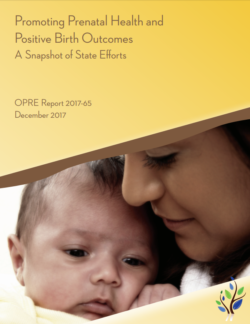Promoting Prenatal Health and Positive Birth Outcomes: A Snapshot of State Efforts
- Authors:
- Mariel Sparr
- Alexandra Joraanstad
- Grace Atukpawu-Tipton
- Nicole Miller
- Julie Leis
- Jill Filene
To address poor birth outcomes in the United States, the Centers for Medicare and Medicaid Services (CMS) developed the Strong Start for Mothers and Newborns initiative.
 The initiative is studying enhanced prenatal care approaches aimed at reducing preterm births among Medicaid and Children’s Health Insurance Program (CHIP) beneficiaries who are at high risk for poor birth outcomes.
The initiative is studying enhanced prenatal care approaches aimed at reducing preterm births among Medicaid and Children’s Health Insurance Program (CHIP) beneficiaries who are at high risk for poor birth outcomes.
As part of the Strong Start initiative, CMS, in partnership with the Administration for Children and Families and the Health Resources and Services Administration, established the Mother and Infant Home Visiting Program Evaluation-Strong Start (MIHOPE-Strong Start). It is evaluating the effectiveness of evidence-based home visiting for improving birth outcomes, maternal and infant health, health care use, and prenatal care use among women enrolled in Medicaid or CHIP. The evaluation is being conducted by MDRC with subcontractors JBA, Johns Hopkins University, Mathematica Policy Research, and New York University.
This report presents findings from a qualitative substudy of MIHOPE-Strong Start designed to provide a snapshot of state efforts to promote prenatal health and improve birth outcomes, including home visiting. The report summarizes findings for three primary research questions:
- What initiatives and efforts are states implementing to promote prenatal health and positive birth outcomes?
- Who are the major stakeholders involved in efforts to promote prenatal health, improve birth outcomes, and implement home visiting?
- How are states funding initiatives and efforts to promote prenatal health, improve birth outcomes, and implement home visiting?
Forty interviews with representatives from 17 states contributed to the qualitative analysis and study findings. Interviews were conducted with program administrators from state agencies that administer Maternal, Infant, and Early Childhood Home Visiting (MIECHV) programs, state Medicaid agencies, and other entities involved in home visiting.
- States included in the report have launched multipronged efforts to promote prenatal health and improve birth outcomes. These efforts are intended to make advances toward several goals, including increasing access to prenatal care, reducing infant mortality, addressing neonatal substance exposure, and reducing disparities in preterm birth rates.
- Interview respondents identified a broad cross-section of stakeholders and partners. Common stakeholders and partners involved in efforts to promote prenatal health, improve birth outcomes, and implement home visiting include public agencies, national organizations, and collaborative groups. Some examples include departments of health, human services, and education; child welfare agencies; advisory groups; committees; task forces; and working groups.
- Respondents from all 17 states mentioned using a variety of funding mechanisms. The most common funding sources mentioned were MIECHV, the Title V Maternal and Child Health Block Grant Program, Temporary Assistance for Needy Families, and general-purpose state tax funds. In 9 of the 17 states, Medicaid funds are used in some way for home visiting.

